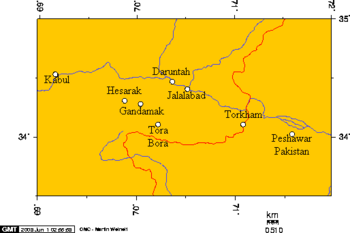Jalalabad: Difference between revisions
John Leach (talk | contribs) m (Text replacement - "Afghanistan" to "Afghanistan") |
mNo edit summary |
||
| (3 intermediate revisions by one other user not shown) | |||
| Line 1: | Line 1: | ||
{{subpages}} | {{subpages}} | ||
{{Image|Kabul, Peshawar, and some cities in Nangarhar, Afghanistan 6.png|right|350px| Kabul, Peshawar, and some cities in Nangarhar, Afghanistan.}} | {{Image|Kabul, Peshawar, and some cities in Nangarhar, Afghanistan 6.png|right|350px|Kabul, Peshawar, and some cities in Nangarhar, Afghanistan.}} | ||
'''Jalalabad''' is the capital of [[Nangarhar Province]], | '''Jalalabad''' is the capital of [[Nangarhar Province]], and is one of the largest cities in Afghanistan. Its population is primarily of [[Pashtun]] ethnicity. | ||
==History== | ==History== | ||
Present-day Jalalabad was the major city of the ancient Greco-Buddhist center of Gandhara. [[Babur]], founder of the Moghal empire of India, chose the site for the modern city, which was built c.1570 by his grandson, Akbar. | Present-day Jalalabad was the major city of the ancient Greco-Buddhist center of Gandhara. [[Babur]], founder of the Moghal empire of India, chose the site for the modern city, which was built c.1570 by his grandson, Akbar. In 1842, during the First Afghan War, British troops held Jalalabad against an Afghan siege.<ref name=Col>{{citation |contribution=Jalalabad |title=The Columbia Encyclopedia | edition=Sixth Edition |year=2008 |url=http://www.encyclopedia.com/doc/1E1-Jalalaba.html}}</ref> | ||
Jalalabad against an Afghan siege. | |||
==Economics and transportation== | ==Economics and transportation== | ||
The city has a university and medical school. Oranges, rice, and sugarcane grow in the fertile surrounding area, and the city has cane-processing and sugar-refining as well as papermaking industries. | The city has a university and medical school. Oranges, rice, and sugarcane grow in the fertile surrounding area, and the city has cane-processing and sugar-refining as well as papermaking industries. It lies on one of the country's first paved roads, connecting the capital [[Kabul]] with the border crossing at [[Towr Kham]] and, ultimately, [[Peshawar]] in Pakistan. | ||
It lies one of the first paved roads, connecting | |||
==References== | ==References== | ||
{{reflist}} | {{reflist}} | ||
[[Category:Reviewed Passed]][[Category:Suggestion Bot Tag]] | |||
Latest revision as of 17:00, 3 September 2024
Jalalabad is the capital of Nangarhar Province, and is one of the largest cities in Afghanistan. Its population is primarily of Pashtun ethnicity.
History
Present-day Jalalabad was the major city of the ancient Greco-Buddhist center of Gandhara. Babur, founder of the Moghal empire of India, chose the site for the modern city, which was built c.1570 by his grandson, Akbar. In 1842, during the First Afghan War, British troops held Jalalabad against an Afghan siege.[1]
Economics and transportation
The city has a university and medical school. Oranges, rice, and sugarcane grow in the fertile surrounding area, and the city has cane-processing and sugar-refining as well as papermaking industries. It lies on one of the country's first paved roads, connecting the capital Kabul with the border crossing at Towr Kham and, ultimately, Peshawar in Pakistan.
